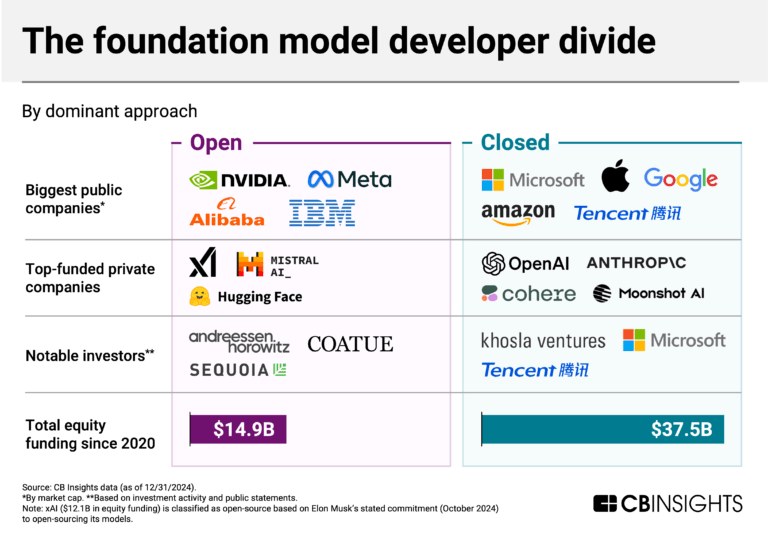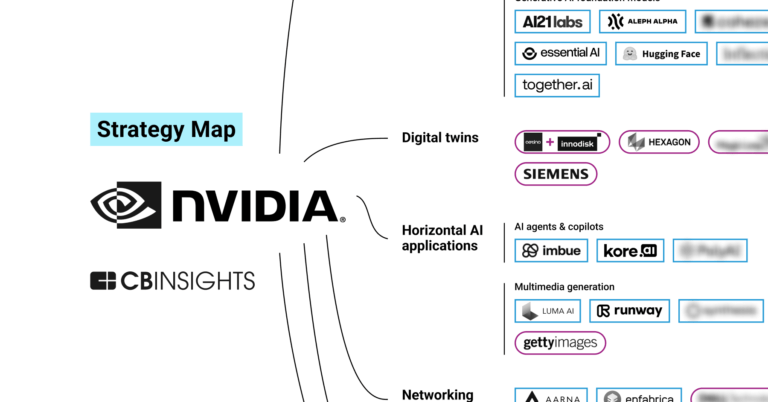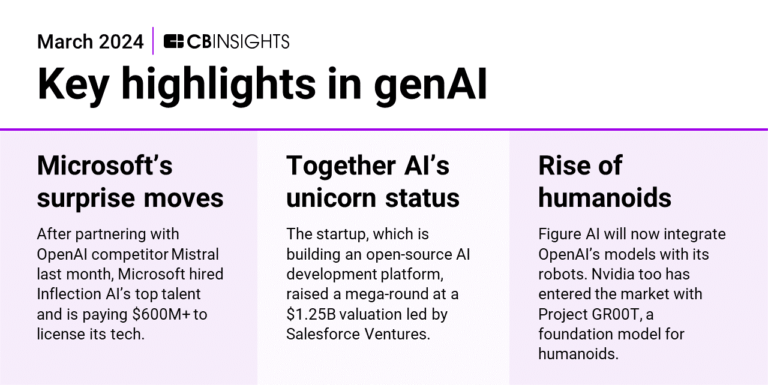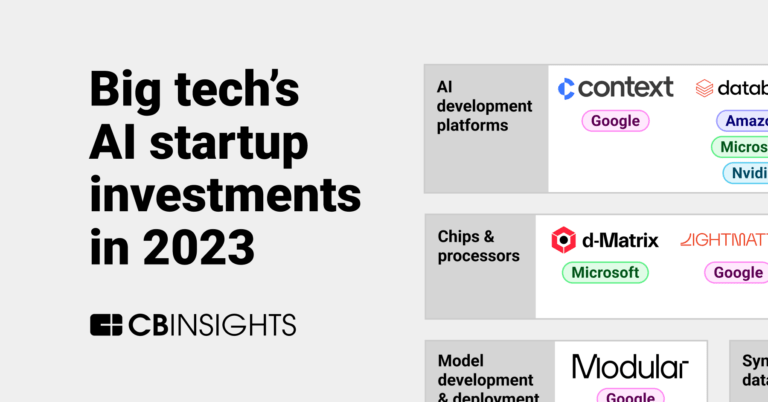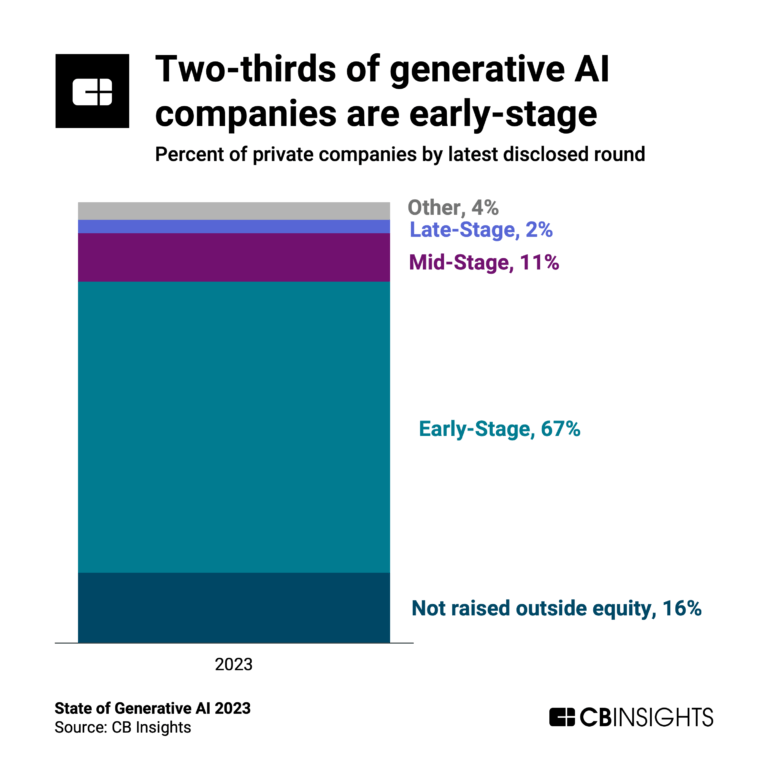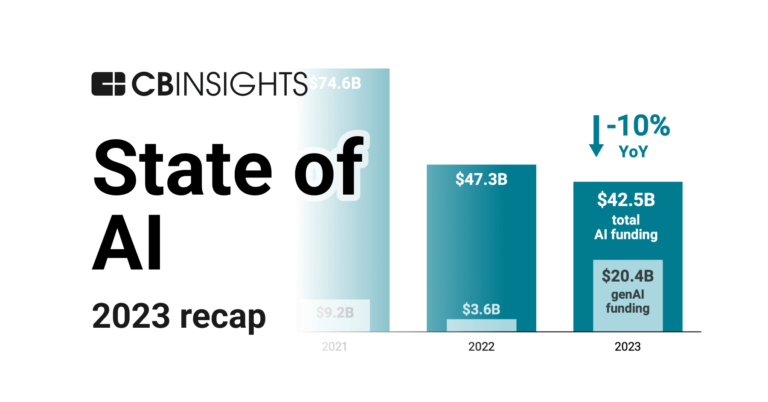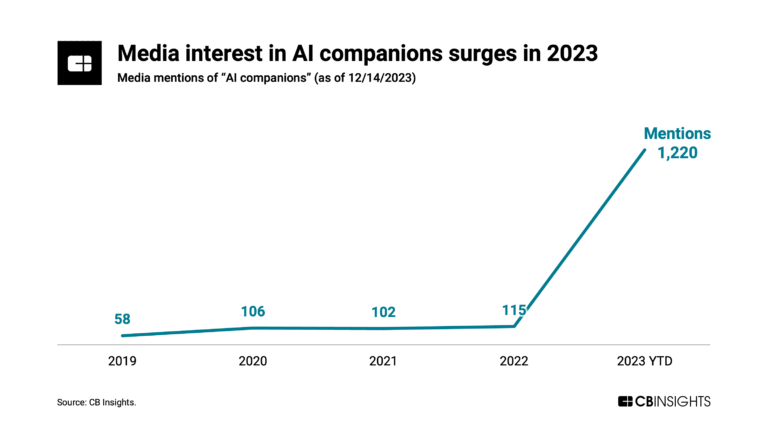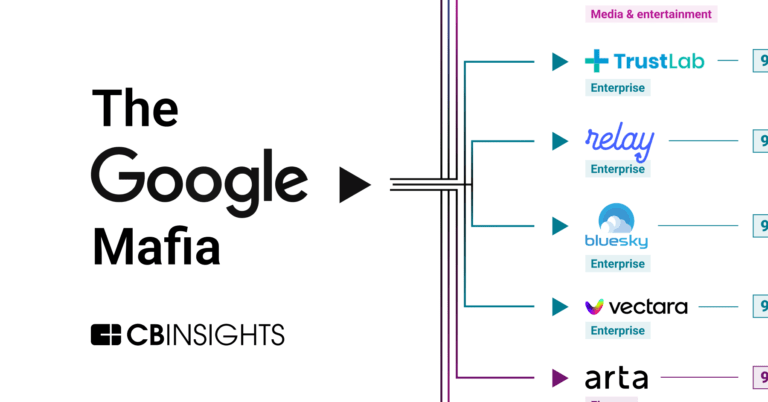
Inflection AI
Founded Year
2022Stage
Series B | AliveTotal Raised
$1.525BValuation
$0000Last Raised
$1.3B | 2 yrs agoMosaic Score The Mosaic Score is an algorithm that measures the overall financial health and market potential of private companies.
+13 points in the past 30 days
About Inflection AI
Inflection AI focuses on enterprise artificial intelligence, providing artificial intelligence (AI) model training and tuning while addressing data security and cost efficiency for enterprise clients. The company's solutions integrate into business operations. It was founded in 2022 and is based in Palo Alto, California.
Loading...
ESPs containing Inflection AI
The ESP matrix leverages data and analyst insight to identify and rank leading companies in a given technology landscape.
The AI companions market utilizes artificial intelligence to create conversational agents capable of engaging in natural language conversations with humans. These agents are designed to understand and respond to user queries, providing personalized solutions and recommendations. The technology behind these agents is constantly evolving, with new advancements in natural language processing and mach…
Inflection AI named as Leader among 5 other companies, including Character.AI, Soul Machines, and Chai.
Inflection AI's Products & Differentiators
Developer API
self-service inference API endpoint
Loading...
Research containing Inflection AI
Get data-driven expert analysis from the CB Insights Intelligence Unit.
CB Insights Intelligence Analysts have mentioned Inflection AI in 15 CB Insights research briefs, most recently on Jan 8, 2025.
Expert Collections containing Inflection AI
Expert Collections are analyst-curated lists that highlight the companies you need to know in the most important technology spaces.
Inflection AI is included in 5 Expert Collections, including Unicorns- Billion Dollar Startups.
Unicorns- Billion Dollar Startups
1,270 items
AI 100
100 items
Generative AI 50
50 items
CB Insights' list of the 50 most promising private generative AI companies across the globe.
Generative AI
1,299 items
Companies working on generative AI applications and infrastructure.
Artificial Intelligence
7,221 items
Latest Inflection AI News
Mar 28, 2025
The company has a new enterprise-focused mission since Microsoft hired away its co-founders. Inflection • 8 min read Once among the highest-flying AI startups, Inflection has spent the last several months shifting its focus to more down-to-earth tech. Around a year ago, the startup’s path was forever altered when Microsoft inked a deal to license Inflection’s models and hire much of its staff, including co-founders Mustafa Suleyman and Karén Simonyan. Since then, CEO Sean White, who joined to replace Suleyman around the same time, has charted a new course focused more on practical enterprise use cases and less on chasing superintelligence. White is zeroing in on a few key advantages—the conversational or emotional intelligence of its models, their ability to run on-premises or in private clouds, and its institutional know-how. Tech Brew spoke with White about Inflection’s new mission, why he sees the AGI race as a distraction, and what he thinks of the hype around agents. This conversation has been edited for length and clarity. Tell me about how Inflection has pivoted since the Microsoft deal. I want to spend a moment on this because I want to clarify a couple things. We’re an independent company. All Microsoft did is they licensed our code and our intellectual property. They did not get access to any of the user information—there was no acquisition. They had to make a copy…Now, Mustafa did leave. He went to Microsoft to become CEO of Microsoft AI and I was brought in to replace him. And that was the point where we started the pivot. And maybe a little bit about that: I joined for several reasons. My PhD is in computer science; I have always been, just in general, interested in how we use technology to make the human experience better. And in my mind, [Inflection is] a public benefit corp that is trying to do the same thing, focused on AI, and one of the seven companies that is a leader in building these frontier models. And it is weird. With my academic background, you would normally say, “And here are the papers for all these different things.” A lot of the growth around this is really in what almost feels like alchemical texts, which is really the knowledge passed down to get these large models to converge. And so it’s still, like, we can converge hundreds of billions of parameters. Google obviously can at DeepMind. Microsoft can now, because they licensed our code. But Apple can’t, Netflix can’t, Amazon can’t. And that’s worth keeping in mind. The ecosystem is changing so quickly, but there’s a lot of important know-how. So when I joined, I hired a new leadership team. I brought on some folks that I knew and trusted or who were exceptionally talented…We kept Pi [Inflection’s chatbot] going. Part of that was, in my mind, the execution of the public benefit corp, but it was also that it was a great example of one of the characters that we have, which was this really, really high conversational intelligence. Sometimes we’ll talk about it as emotional intelligence. There are lots of versions of that and where that comes into play, but it meant that it was and is still best in class. If everybody’s racing toward the IQ, there was a place that we were also racing toward, and had spent a lot of money and time and effort on a unique data set built over two years to create. So then we opened up an API so that commercial users could start building things and testing it out and getting a feel for it, and started running these voice-of-the-customer meetings…There were a couple of commonalities. One, we felt like for a large number of them, they cared about the conversational intelligence and fine-tuning to their corporation. Two, some subset of them really cared about the aspect of their data never leaving and going to another system, particularly regulated industries. In what kinds of enterprise use cases is this sort of conversational intelligence most important? I’ll give you a couple of examples. For the API, they are just starting to experiment. Sometimes that is what you might think of, like, someone is building a system to talk to a spreadsheet or we have people who are looking at it for wellness...We have hundreds of people using the API paying for that quality. And then there are the folks who want it on-prem and private and have the conversational intelligence. One of the most recent ones—I can’t tell you the name of the company—but they are using it for wealth management, where, one, they cannot let that data leave their network. It has to stay there. And two, it’s really important for them to actually have a system that has a high level of conversational intelligence and EQ. You might say “Sean, why does that even matter?” It comes from a couple of things. One, they are using the system to help them in what they say and do and interact. We bought two companies, one called BoostKPI, one called Jelled.ai. BoostKPI helped us accelerate our work on doing data analysis; we could have done a lot with the data itself and data warehouse, and Jelled.ai, same thing, except around things like email, accounting, all of the sort of organizational systems. But none of that matters if you’re just getting like a book report, as opposed to the Socratic dialogue that lets you actually get something done, learn something, understand something. And so the wealth management example of this, we’ve had folks who are using and experimenting with internal support or internal data access, and some you just need to have private access to very large-scale data sets. Keep up with the innovative tech transforming business Tech Brew keeps business leaders up-to-date on the latest innovations, automation advances, policy shifts, and more, so they can make informed decisions about tech. Subscribe How does being structured as a public benefit corporation play a role in your new mission? I was around for the first internet revolution. I did a startup then as well, and you get to choose how you steer the industry, and that matters both for the industry and for society. The public benefit corp means that we can make choices that are aligned with this being better for society, which oftentimes I think is better for the business. I’ll use the example of—I feel bad, not intentionally—but Character.ai had some really bad incidents. That was bad for people, also really bad for the AI industry. And so the public benefit corp, and we have support from the board, lets us make choices that may on the surface look like they are giving Pi away for free. We do that, and there are people who every day send us messages saying, “Oh, this is great. It helps me do something.” But we also learn about how people are using these systems at work. Trust is this thing that takes so long to earn, and you can lose it in seconds. And I think the public benefit corp means that it also gives people a way to at least ask us, “Why should we trust you? How do we know you’re not going to just make some decision and abandon us?” And I like that structure. It means that we get to have a discussion. You’ve said in other interviews that Inflection is no longer focused on building next-generation frontier models. Does that race not fit with this new enterprise-focused mission? Actually, our CTO, Vibhu Mattal, just put a post up about a new family of models that we have. And so the point I was trying to make is, if there are folks who are trying to build these 500,000-GPU systems, million-GPU systems, we’re not going to go into that race…We are still generating new system models that have more parameters than our previous models, that are state-of-the-art. We’ve been using a mixture of experts for a while…that have competitive scores…But I didn’t want to get into this “we’re racing into AGI.” I think it’s a distraction for us. I’m much more interested in, “How do we build things to augment people and augment organizations,” as opposed to, “How do we make AGI?” Literally, it’s a design criterion–—which one do you want to focus on? What do you think of all of the hype right now around AI agents? Is that something you’re thinking about? My team hates me sometimes, because when someone says, “Oh, it’s agentic,” I say, “Really? What does that mean?” Even in the late ’80s, early ’90s, people were working on these agentic systems. In that case, what it meant was like one system talks to another system and they exchange some stuff; they go away. And right now, that feels like it can mean anything from “I looked at all the pixels, and I watched what you were doing…I see what you’re doing, and now I’m going to mirror that for you and kind of help you do it.” And I agree, I think that’s interesting. Or it might be, “I have a whole set of tasks that are all piled together, and I’m gonna put it in a cron job.” And it might also mean, “Oh, well, I have a whole series of systems that represent me and a whole series of systems that represent you, and they’re gonna talk to each other, and they’re gonna do their thing.” Those are three models of agentic AI today. And I think for us, what we have done has been pretty practical. So we have research work…around agentic AI, the various flavors of it. We also announced a partnership with UiPath. And part of this was that reading pixels is fantastic. It’s really cool. It works 40% of the time. That will improve the same way that speech recognition improved. There’ll be some disruptions. But right now, we need something that works. And so I think of it as a stepping stone where we use some of the systems like UiPath, where the LLM is the probabilistic part, and UiPath is the deterministic part, and we build from there. Copy Keep up with the innovative tech transforming business Tech Brew keeps business leaders up-to-date on the latest innovations, automation advances, policy shifts, and more, so they can make informed decisions about tech. Subscribe
Inflection AI Frequently Asked Questions (FAQ)
When was Inflection AI founded?
Inflection AI was founded in 2022.
Where is Inflection AI's headquarters?
Inflection AI's headquarters is located at 650 Page Mill Road, Palo Alto.
What is Inflection AI's latest funding round?
Inflection AI's latest funding round is Series B.
How much did Inflection AI raise?
Inflection AI raised a total of $1.525B.
Who are the investors of Inflection AI?
Investors of Inflection AI include Eric Schmidt, Reid Hoffman, Microsoft, Gates Frontier, NVIDIA and 9 more.
Who are Inflection AI's competitors?
Competitors of Inflection AI include OpenAI, Anthropic, xAI, Aleph Alpha, Neural Magic and 7 more.
What products does Inflection AI offer?
Inflection AI's products include Developer API and 2 more.
Who are Inflection AI's customers?
Customers of Inflection AI include Intel and Umbrage.
Loading...
Compare Inflection AI to Competitors

Anthropic operates a safety and research company focused on developing AI systems. The company's main offerings include Claude, an AI assistant for various tasks, and a suite of research initiatives aimed at AI safety and interpretability. Anthropic's research includes natural language processing, human feedback, reinforcement learning, and other areas. It was founded in 2021 and is based in San Francisco, California.

xAI focuses on artificial intelligence, specifically in the domain of language learning models. The company's main product, Grok, is designed to answer questions and suggest potential inquiries, functioning as a research assistant that helps users find information online. xAI primarily caters to the artificial intelligence (AI) research community and the general public seeking AI tools for information retrieval and understanding. It was founded in 2023 and is based in Palo Alto, California.

AI21 Labs operates as an artificial intelligence (AI) lab and product company. The company offers a range of AI-powered tools, including a writing companion tool to assist users in rephrasing their writing and an AI reader that summarizes long documents. It also provides language models for developers to create AI-powered applications. It was founded in 2017 and is based in Tel Aviv, Israel.
Fireworks AI specializes in generative artificial intelligence (AI) platform services, focusing on inference and model fine-tuning within the artificial intelligence sector. The company offers an inference engine for building production-ready AI systems and provides a serverless deployment model for generative AI applications. It was founded in 2022 and is based in Redwood City, California.

DeepSeek focuses on the development of artificial general intelligence (AGI) within the technology sector. The company offers a platform that facilitates easy API calls for integrating AI capabilities and a chat interface for exploring AGI applications. DeepSeek's products are designed to serve as efficient AI assistants for various user needs. It was founded in 2023 and is based in Hangzhou, China.

Cohere is an enterprise artificial intelligence (AI) platform that develops artificial intelligence solutions. The company offers AI models for text generation, document analysis, and assistant development, which can be integrated into enterprise workflows. Cohere's solutions serve various sectors including financial services, healthcare, manufacturing, energy, and the public sector. It was founded in 2019 and is based in Toronto, Canada.
Loading...

